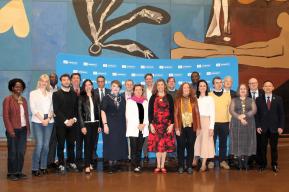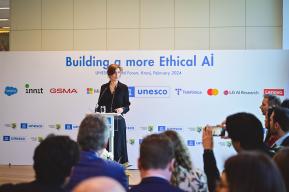文章
人工智能和文学创作: 果真皆大欢喜吗?

卡尔·施罗德(Karl Schroeder)热爱阅读、研究、评论和想象未来故事。作为国际科幻小说界的明星,他的书启发了新技术和人工智能(AI)领域的专家。此外,他运用自己的想象力为公司和政府服务,协助预测技术、经济和社会变革。这位加拿大小说家和散文家认为,人工智能不仅是一次技术变革,更是一场文化变革,要求人们反思伦理、治理和立法问题。
卡尔·施罗德;玛丽·克里斯蒂娜·皮诺特·德穆兰斯(UNESCO) 担任采访
除了对数字和技术创新抱有热情之外,您还从哪里获得创作灵感?
我用了大量时间阅读先贤哲人的作品并从中悟出一个道理:一定要考虑技术发展和社会运动之间可能存在的关联。但我向你保证,我对故事情节同样重视,这样我的书才会有趣!
另一方面,互联网提供了无穷无尽的信息和话题。每次上网看一看,都会有新的发现,激励我重新思考,甚至是全盘推翻我刚刚写下的内容。互联网确实为我的研究工作带来便利,而且我只采撷其中的精华。
人工智能会有取代作家的一天吗?
此时此刻,我认为人工智能在科幻创作领域的作用基本上等同于随机函数。这就好比拿出一副扑克牌,每张牌都代表着一个角色、一处场景或其他内容,其中一张牌是“坏人的首领站在一座塔楼旁边”,我可以由此构思出一个角色或是一段情节。
我认为,创造力不会永远局限在人类身上。我可以想象,人工智能有朝一日能够创做出一本名副其实的书,但目前的人工智能肯定还做不到这一点,只能留待我们还没有发明出来的新一代机器来完成了。
今天的计算机不会凭空赋予事物某种意义,即便技术设备日趋完善,并且正在接近人类的能力,人为干预在创作过程中依然必不可少。
我在小说《迷宫夫人》(Lady of Mazes)中描写了这样一段情节:人工智能丧失理智,引爆了某种创造力炸弹,形成了数以百万计异常精彩的小说,数量多到所有人加在一起都读不完!那么,人类会怎么做呢?人们很快就适应了这种情况,然后接着写自己的小说。
试想这枚创造力炸弹今天爆炸,我为什么要就此搁笔,不再继续我的创作呢?我为什么一定要认为“我与一百万本书对立”,而不是“我和一百万本书共存”呢?我认为创造力,无论来源如何,都是对人类自身存在的一种补充,而不是减损。
事实上,替代是价值概念中固有的内容。我们认为,只要价值相当,任何事物都是可以被替代的。假如计算机在商业上比我做得更成功,那么它就可以替代作为一名作家的我。但要让这个推理成立,前提是价值体系以商业成功为风向标。
这是否意味着,您并不担心人工智能?
决定人工智能到底是威胁,还是裨益,完全是人类的责任。关于人工智能、其如何工作、为什么会对人类构成威胁,存在很多简单化的认识。人们甚至可以说,整日担心对机器失去控制,是一种言过其实的焦虑。在现阶段,这种想法是不现实的。
另一方面,当务之急是确定人工智能的未来发展方向和使用方式。如果我们决定开发超级机器,用来发动经济或政治战争,我们自然会营造出充满敌意的环境。人类社会必须为人工智能的开发做出正确的决定。
假如有一天,人工智能产品脱离人类,独立存在,它们会像孩子离开父母那样,在时机成熟时开始自己的新生活。作为父母,我们的责任是抚育后代,培养积极向上的价值观。这才是论证的基石。
这与伦理问题有关吗?
是的,科幻小说百年来一直在思考伦理问题,而决策者和人类社会才刚刚开始认识到这些问题。这是由于,每逢出现重大技术创新,我们总是任由其自由发展,从不认真考虑其中的伦理问题。即便如此,解决方案也并不复杂。面对一项新技术,我们必须先确定其社会影响,决定其用途,并制订相应立法,然后才能决定采用这项技术。
这是我创作《迷宫夫人》的主旨之一,我希望可以鼓励人们在落实任何技术创新之前,都先做好规划工作,更准确地预测社会变化。
您下一本书的主题是什么?
肯定会涉及未来的政治和决策过程,还有带领人类进入另一个文明阶段的技术手段。
开玩笑的,不过我正想着用笔把它写下来。这将是一次实验,就像我们使用数字工具一样。我们必须能够区分写作和写作手段。技术只是一种手段,必须退回到适当的位置。我们没有必要放弃我们的现在和未来,我们要做的,只是让所有人都做好准备。
Karl Schroeder, interviewed by Marie Christine Pinault Desmoulins (UNESCO)
Besides your passion for digital and technological innovations, what are your sources of inspiration?
I devote a substantial part of my time to reading great philosophers. This allows me to have an overview, to consider the possible connections between technologies and societal movements. But, let me reassure you, I give just as much attention to the plot, so that my books are entertaining!
At the same time, the internet is an infinite source of information and distraction. Any navigation on the network is an opportunity for new discoveries that may encourage me to rethink, or even to change radically, everything I have just written. The internet really makes my research easier and I take only the best from it.
Do you foresee that AI could one day replace you as a writer?
At this time, I would equate the contribution of AI in my field to a randomization function, comparable to laying out a deck of cards, each of which could define a character, a scene, etc. For example, one of them could be “the king of the bad guys, he is next to a tower" and from there, I could develop a character, a plot.
I believe that creativity could eventually happen outside of human beings. So I can imagine that AI will be able to create a book worthy of the name, but certainly not in its current form. These will be different kinds of machines, which we have not yet thought up. Today’s computers do not produce meaning, and human intervention is always necessary in the creative process, even if technological devices are becoming more refined and approaching human capabilities.
In my novel, Lady of Mazes, there is a scene where AI is going insane and sets up a kind of creativity bomb that fuels millions and millions of novels of exceptional quality, literally too many for people to read in all their collective lifetimes! And so, what happens to humans? Well, they adapt and continue their own creation.
Imagine that this creative bomb were to explode today. Why would that prevent me from continuing to write new books? Why should I think “me against a million books” and not “me and a million books?” I consider creativity – whatever its origin – an addition, and not a subtraction, to our own existence.
In fact, the notion of replacement is inherent in the concept of value. We could consider that everything can be replaced, according to a given value. As a writer, I could be replaced by a computer that has more commercial success than me. But this reasoning is only valid if commercial success prevails in the value system.
Does this mean you have no apprehensions about AI?
Determining whether AI is a threat or a benefit is entirely a human responsibility. There are many simplistic ideas about AI, how it works, and why it could be a threat to humanity. One could even say that there is an exaggerated anxiety focused on losing control of the machine. At the stage where we are today, this is not an effective way of thinking.
On the other hand, it is imperative to choose the direction that AI will take and to decide how it will be used. If we decide to invest in supermachines for economic or political warfare, we are taking the path of building a hostile environment, of course. Society must make the right decisions for the implementation of AI.
If one day the products of AI become independent of us, they will be like the children who leave us when the time comes, to lead their own lives! Our responsibility as parents is to nurture them and to instil positive values. This is the cornerstone of the argument.
Is this related to the question of ethics?
Yes, science fiction has been thinking about all this for a century! Policymakers and society are only just beginning to think about these issues. It’s because we aren’t seriously examining the subject that we resort to free-wheeling every time a major technological innovation is introduced. Even so, the solution is simple – we must decide to implement a new technology only after having identified its social impact, determined its use and legislated accordingly.
I made this issue one of the messages in Lady of Mazes – to encourage us to plan the implementation of any technological innovation, to better anticipate societal changes.
What will be the message of your next book?
It will undoubtedly deal with the future of politics and decision-making processes, and also the technological means that could take us to another level of civilization.
That’s a joke, but I am thinking of writing it with a pen! It will be an experiment of use, just like the ones that digital tools offer us. We must be able to distinguish writing from the means of writing. Technology is only a means, and it must be put back in its proper place. There is nothing we need to give up about what we are or what we want to be – we only have to prepare ourselves collectively.
Karl Schroeder
A science fiction novelist, essayist and futurist, Karl Schroeder (Canada) is the author of ten novels, translated into as many languages. They include Ventus (2000), Permanence (2002), Lady of Mazes (2005), Crisis in Zefra (2005) and Lockstep (2014). He received the Netexplo Talent Prize at UNESCO in February 2018.

In the same issue








